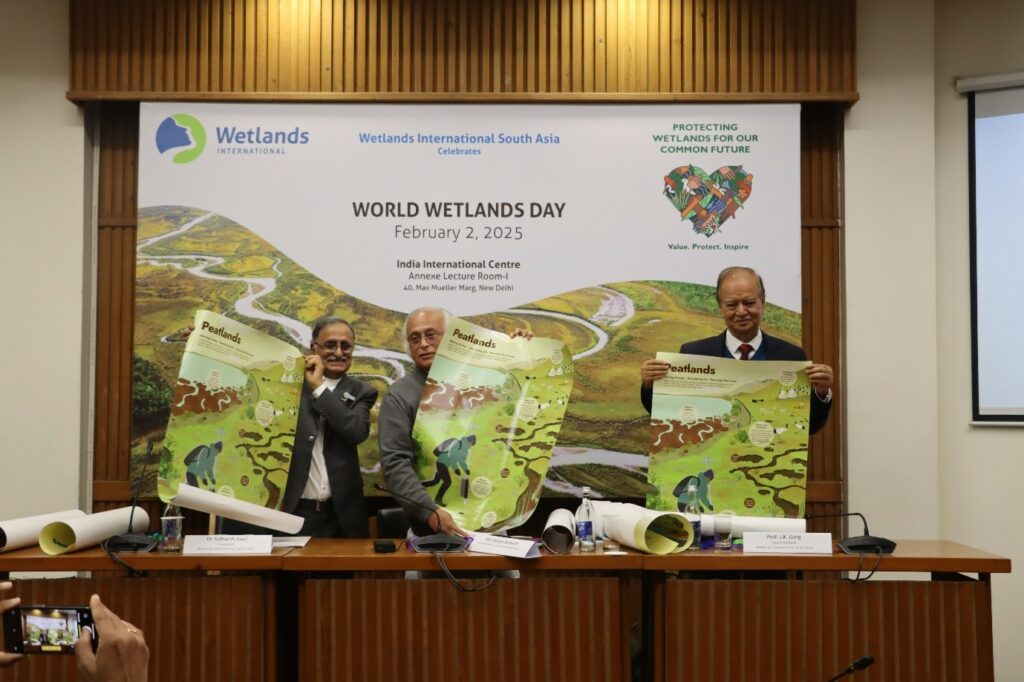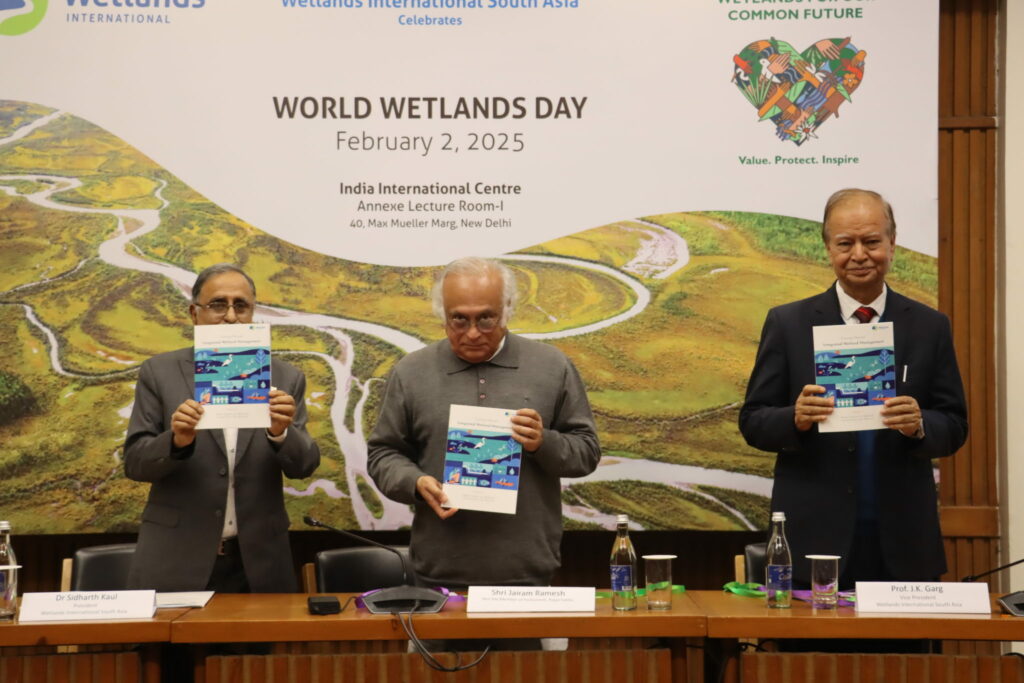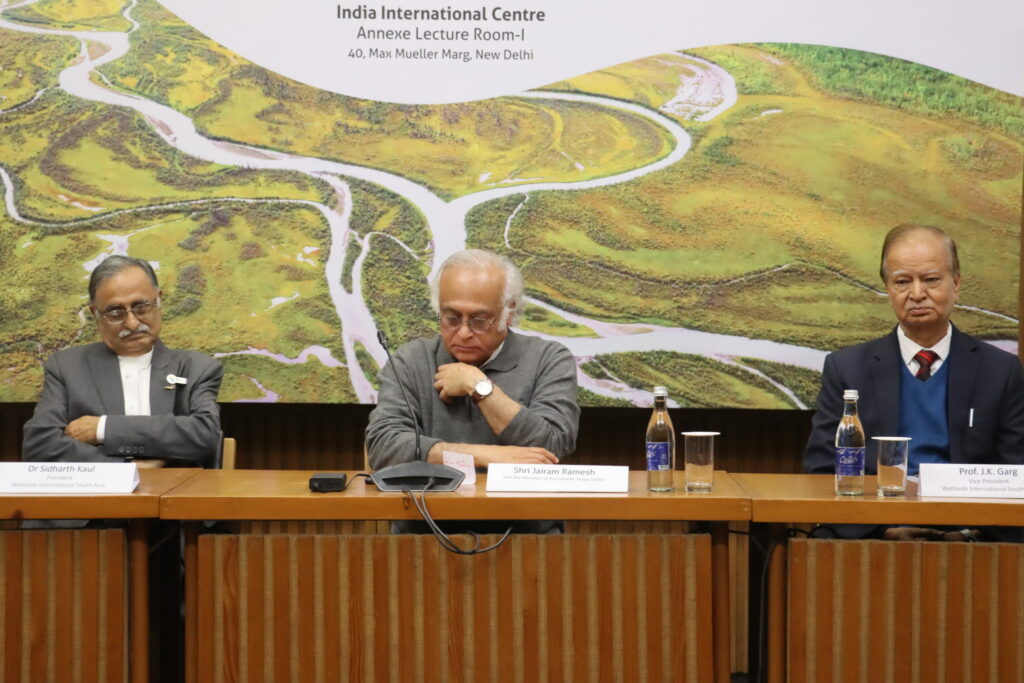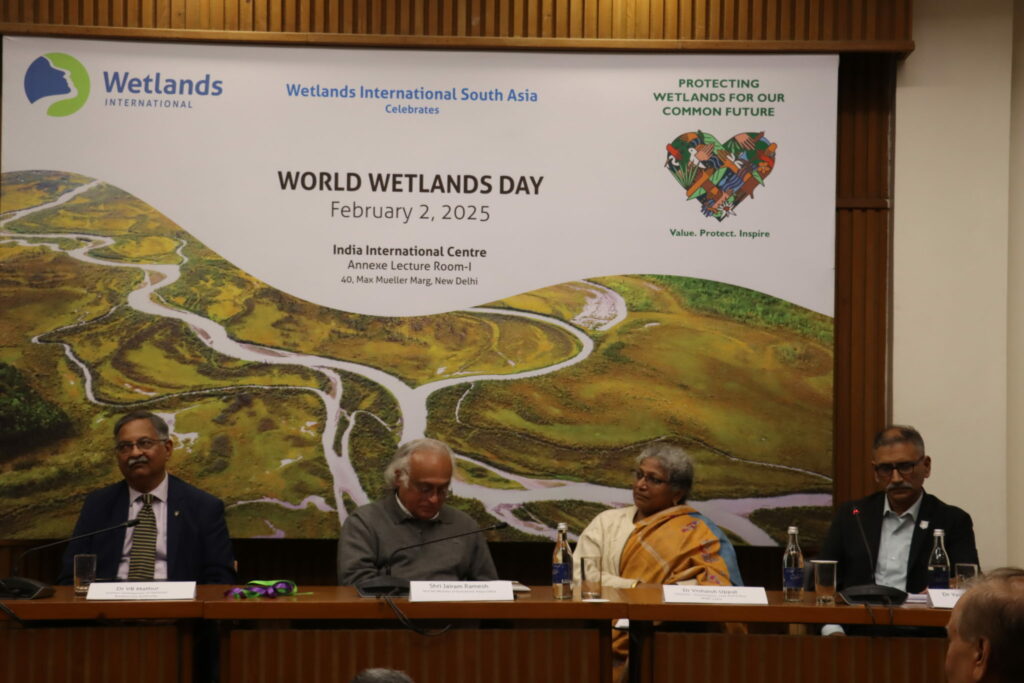
Protecting Wetlands for Our Common Future, World Wetlands Day, 2025
-
Capacity development
-
Wetland values, status and trends
World Wetlands Day organized on the 2nd of February 2025 at the India International Center, New Delhi

The second of February each year is celebrated as World Wetlands Day (WWD) to mark the date of adoption of the Ramsar Convention – an international treaty established in 1971 to provide the framework for international collaboration and national action for the conservation and wise use of wetlands. Each year, WWD is linked to a specific theme to draw the global community’s attention to issues related to wetlands conservation. The theme for World Wetlands Day 2025 is ‘Protecting Wetlands for Our Common Future’ which underscores the urgency of global efforts and bold transformative actions to protect wetlands for the welfare of all people and ensure the continuity of benefits for future generations.
To mark WWD, Wetlands International South Asia organised a public event at Annexe Lecture Room-I, India International Centre, New Delhi to sensitize society to the multiple values of wetlands and their role in human well-being. Shri Jairam Ramesh, Hon’ble Member of Parliament, Rajya Sabha and Formerly Union Minister, Ministry of Environment, Forests and Climate Change, Government of India, graced the event as the Chief Guest. The panel discussion on “Wetlands and Sustainable Development” brought together eminent environmentalists, including Dr Yash Veer Bhatnagar (Country Representative, IUCN-India), Dr Vishaish Uppal (Director – Governance, Law and Policy WWF-India), Dr VB Mathur (Former Chairperson of National Biodiversity Authority). The session was chaired by Shri Jairam Ramesh. Dr J. K Garg, Vice President, Wetlands International South Asia gave the concluding summary of the session. The event was attended by about 70 dignitaries from central government agencies, international organizations, academia, civil society, media and experts.
Two publications were released on the occasion. A document on peatlands estimation in India, which unveils the total carbon stock stored in wetlands, was released. A training manual on managing water quality in wetlands was also released. Three posters were released on the occasion – Ramsar poster on World Wetlands Day with the theme of protecting wetlands for our common future inspiring actions for wetland conservation, A World Wetland Day poster with the theme “Wetlands and Human Wellbeing” highlighting the urgent need to safeguard wetlands for human wellbeing and prosperity was released and a poster on peatlands in India showcasing peatland values and service in India.

Dr Sidharth Kaul (President, Wetlands International South Asia) introduced the theme of the World Wetlands Day 2025. He highlighted the Wetlands (Conservation and Management) Rules, 2010, enacted during Shri Jairam Ramesh’s tenure as honourable minister of Environment, Forest & Climate change. He also highlighted WISA’s work across 17 Indian states, Nepal, Bangladesh, and the Maldives, focusing on key areas such as: a) Wetland Carbon Storage: Assessing and conserving wetlands’ carbon storage potential, b) Biodiversity Conservation: Protecting and preserving wetland ecosystems and their inhabitants; c) Livelihoods: Supporting communities that depend on wetlands for their livelihoods; d) Water Security: Ensuring wetlands’ role in maintaining water quality and supply; e) Integrated Management: Promoting holistic management of wetlands, and f) Disaster Risk Reduction: Utilizing wetlands as natural buffers against disasters.
Some notable initiatives mentioned by Dr. Kaul include: pioneering efforts in conserving India’s peatlands and assessing their carbon storage potential; developing an index to identify drivers of wetland degradation and conservation strategies; promoting collaboration through the South Asia Platform to enhance monitoring, networking, and capacity building, and developing partnerships with corporates like Tata Motors to conserve wetlands near manufacturing plants.

Shri Jairam Ramesh, Hon’ble Member of Parliament and Former Union Minister in his keynote address, highlighted the importance of wetland conservation in India, tracing the country’s engagement with the Ramsar Convention since 1982, with Chilika Lake as the first designated site. He emphasised the cultural significance of wetlands, especially in regions like Mysuru, and lamented their degradation due to urbanisation, pollution, and industrial activities. Shri Ramesh commended advancements in wetland mapping, noting that the 2024 Wetland Atlas identified wetlands covering 5% of India’s land, with refined classifications. He raised concerns over encroachments and infrastructure projects threatening Ramsar Sites like Deepor Beel and Kolleru Lake and stressed the need for community involvement and decentralised governance in conservation efforts. Shri Ramesh also called for increased scientific research, public awareness, and stronger institutional frameworks to protect India’s wetlands, with local participation central to future initiatives.
Dr V.B. Mathur underscored the indispensable role of wetlands in ecological balance while highlighting the myriad challenges confronting their conservation. Dr Mathur, interrogating the notion of ‘mainstreaming’ conservation, highlighted the critical need for cross-sectoral coordination and the mobilisation of local communities, advocating for the use of citizen science to augment data collection and reinforce local engagement, all within the context of the broader global initiatives such as the UN Decade on Ecosystem Restoration. He also touched on the concept of Other Effective Area-based Conservation Measures (OECMs), discussing their relevance in achieving the 30×30 conservation target.

Dr Uppal, emphasising the evolution of the legal frameworks governing wetland conservation, lamented the lack of coordinated action among myriad agencies, urging a more integrated approach to management that incorporates both top-down and bottom-up strategies, while championing the inclusion of local communities in conservation efforts. She stressed on collective action and collective voicing emphasizing on the equity aspects of wetland conservation initiatives. She discussed the numerous agencies involved in wetlands management—such as Jal Shakti, the CPCB, Ground Water Board, Water Users Associations, and state wetland authorities—and acknowledged that while these organisations could play vital roles, coordination among them on the ground remains a challenge.
Dr Bhatnagar, drawing upon his extensive fieldwork in the high-altitude wetlands of Spiti and Ladakh, elucidated the alarming ecological shifts, such as the diminishing populations of dragonflies and mayflies, exacerbated by habitat degradation and over-tourism, advocating for international cooperation and the establishment of comprehensive management plans to safeguard these fragile ecosystems. He also highlighted how the Freshwater Challenge of IUCN an international programme on restoration of large tracts of waterbodies and the opportunity for India to be a part of the challenge, in demonstrating and documenting the best practices and showcasing to the world.
Students from DPS Faridabad also interacted with panelists and sought suggestions for participating actively in wetland conservation. They were told that they are the future of our country and have to get trained to help in better understanding of wetland values
Collectively, the panel called for a multi-faceted, cooperative approach to wetland conservation, one that marries legal, scientific, and community-driven efforts to combat the mounting threats facing these invaluable ecosystems. Dr J. K Garg summarised the session’s discussions and highlighted the importance of wetlands because they are the only ecosystem with a dedicated portal. He stressed that in a world without wetlands, there will be an acute shortage of food, water and proper sanitation and services like climate change mitigation and disaster risk reduction, failing to adhere to multiple sustainable development goals.
The event concluded with a vote of thanks by Dr Ritesh Kumar, Director, Wetlands International South Asia.
